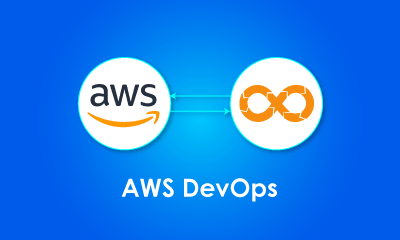AWS Certified DevOps Engineer Training
Course Description
The AWS Certified DevOps Engineer – Professional exam validates technical expertise in provisioning, operating and managing distributed application systems on the AWS platform. Skill Higher AWS Certified DevOps Engineer training has been designed to help an individual in developing advanced technical skills on CodeCommit, Codepipeline, CloudFormation, OpsWorks, Beanstalk and many more, needed to successfully attempt the AWS Certified DevOps Engineer – Professional examination. With this AWS professional certification under your belt, you will join an elite club of AWS Certified DevOps Engineer Professionals who are in high demand by employers worldwide.
Why should you take AWS Certified DevOps Engineer Certification?
Curriculums
-
Learning Objectives: In this module, you will be introduced to important aspects of DevOps and Amazon Web Services. Also, you will get to know about the necessary security concepts required to manage your account and data on the AWS platform.
Topics:
• Understanding DevOps and its lifecycle
• Why DevOps on Cloud?
• Introduction to AWS
• DevOps using AWS
• Security Management – IAM (Identity and Access Management), WAF (Web Application Firewall), AWS Shield, Guard Duty
• Trusted Advisor
• Governance Strategies
Hands-on:
• Creating Policies for a new user to have all Admin Or Limited Privileges
• Login AWS Management Console via MFA
• Trusted Advisor
• Enabling Governance using AWS Config
• Set Alerts and Budget for your AWS Account -
Learning Objectives: In this module, you will learn how to automate Software Development Lifecycle using various AWS development tools.
Topics:
• CodeCommit
• CodeBuild
• CodePipeline
• CodeDeploy
• AWS CodeStarHands-on:
• Working of Code Commit
• Deploy an application using Codepipeline -
Learning Objectives: In this module, you will be introduced to important aspects of CloudFormation. Along with it, you will also learn how to use CloudFormation Templates to model and provision the AWS resources in an automated and secure manner for your application.
Topics:
• Introduction to CloudFormation
• CloudFormation Template
• Intrinsic Functions & Conditions
• Stack Creation
• Advanced CloudFormation Concepts – CloudFormation Nesting, CloudFormation Wait Conditions & Wait Condition Handlers, CloudFormation Helper Scripts, CloudFormation Custom Resources
• CloudFormation Stack Updates
• CloudFormation Resource Deletion Policy
• CloudFormation Best Practices
• TroubleshootingHands-on:
• Creating an S3 Bucket using CloudFormation by Hardcoding the Name
• Creating an S3 Bucket using Intrinsic Function (Join And Ref)
• Creating and Configuring EC2 Instance using Helper Scripts
• Creating a Custom Resource with the help of Lambda Function -
Learning Objectives: In this module, you will learn various aspects of Elastic Beanstalk. Also, you will learn how to deploy and Monitor your application in Beanstalk.
Topics:
• Introduction to Elastic Beanstalk
• Components of Beanstalk
• Deployment Option
• Platform Updates
• Docker in Elastic Beanstalk
• Extending Beanstalk using extensions
• Alarms and Notification
• TroubleshootingHands-on:
• Deploy a Web application with DynamoDB using Beanstalk
• Deploy an application in beanstalk using Docker
• Immutable deployment of the application in Beanstalk
• Creating cron-job on beanstalk instances using .ebextensions -
Learning Objectives: In this module, you will get to know the nitty-gritty of AWS OpsWorks and learn how to create stacks and manage configuration with AWS OpsWorks.
Topics:
• Introduction to OpsWorks
• Components of OpsWorks
• Cookbooks, Recipes, Data bags and Berkshelf
• OpsWorks Lifecycle Events
• OpsWorks Deployment
• OpsWorks Auto-Healing
• TroubleshootingHands-on:
• Deploy an application in OpsWorks Stack
• Integration of CloudFormation with OpsWorks -
Learning Objectives: In this module, you will understand how to implement the concepts of continuous monitoring and management using CloudWatch and CloudTrail. You will also learn to set-up event-driven automated actions.
Topics:
• Introduction to CloudWatch
• CloudWatch Metrics: EC2, ELB, and Auto Scaling metrics
• Custom Metrics
• CloudWatch Alarms
• CloudWatch Agent
• CloudWatch Logs
• Introduction to CloudTrail
• System Manager
• Tagging
• Concepts required to set-up event-driven automated actions – Lambda, SNS, AutoscalingHands-on:
• Configure Amazon CloudWatch to Notify when CPU Utilization of an Instance is greater than 85%
• Enable CloudTrail and store Logs in S3 -
Learning Objectives: In this module, you will learn how to implement highly available and fault-tolerant systems. Also, you will be introduced to Disaster recovery strategies which are effective in making your system resilient at any point of failure.
Topics:
• EBS
• Elastic IP
• Multi region and multi AZs
• SQS
• Data Management in Amazon RDS
• Dynamo DB
• S3
• Provisioning elasticity using Load Balancer and Auto-Scaling
• Components of Auto Scaling
• Horizontal and vertical scaling
• Auto-Scaling Lifecycle
• Recovery Time Objective and Recovery Point Objective
• Disaster Recovery Options
• Overcome single Point of FailureHands-on:
• Working of Load Balancer and Auto-Scaling to support highly available and fault tolerant system -
Learning Objective: In this module, you will learn about container management tools like Elastic Container Registry (ECR), Elastic Container Service (ECS) and Fargate.
Topics:
• Orchestration
• Elastic Container Service
• Amazon ECR
• Select a Launch type for your application
• ECS with EC2
• ECS with Fargate
Hands On:
• To Push An Image Into ECR
• To host a website inside ECS using Fargate launch type

